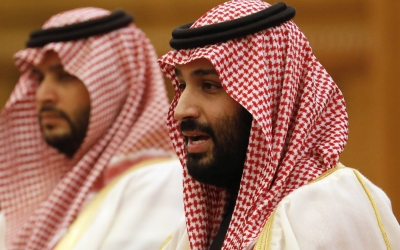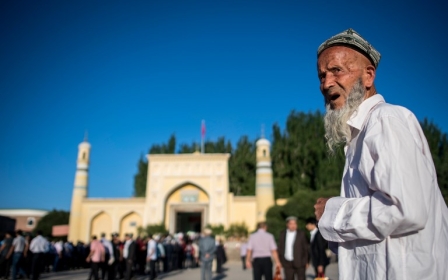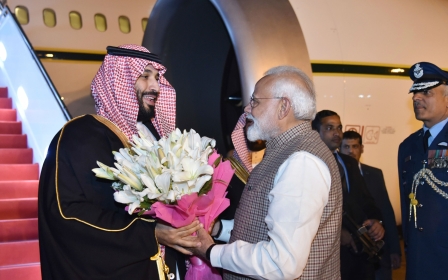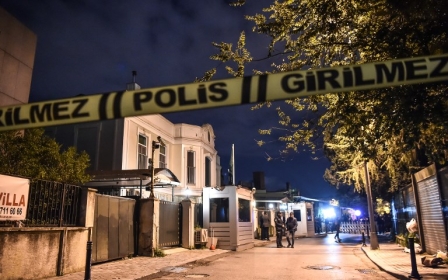MBS's Asia tour throws up a golden gun, a redirected flight and Uighur betrayal
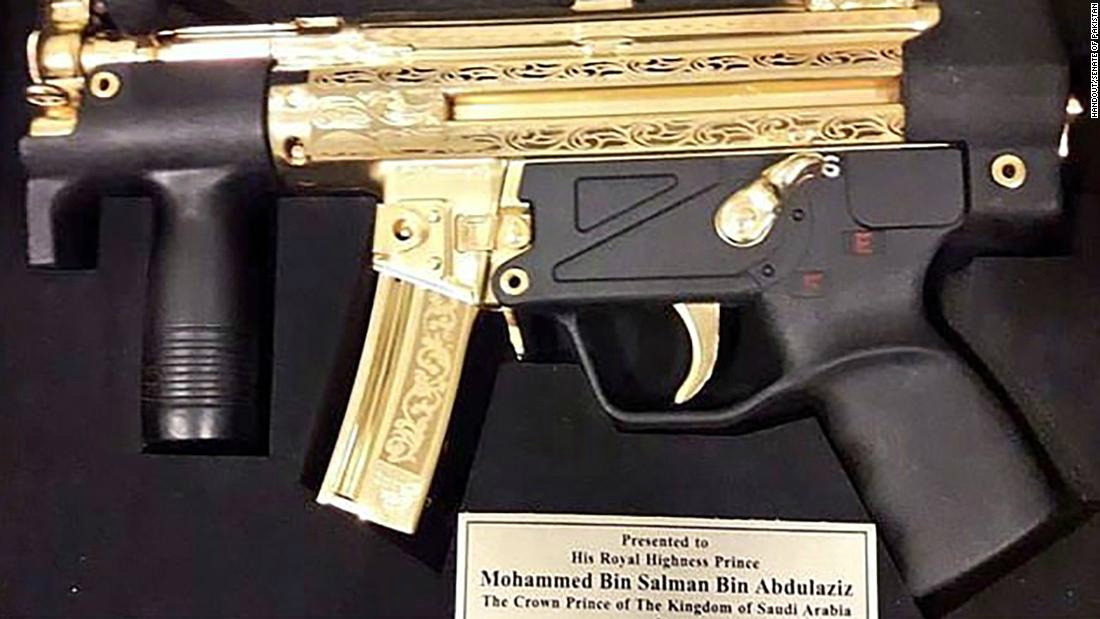
Saudi Crown Prince Mohammed bin Salman has found himself mired amid more controversy on the final day of his tour of Asia as he appeared to defend China's use of internment camps for Muslims in remarks made in Beijing.
The crown prince was on the final leg of a tour of Asia aimed at building relationships and striking deals as the kingdom faces a diplomatic cold shoulder in the West following the killing of Saudi journalist Jamal Khashoggi in October.
Bin Salman had already visited India and Pakistan during his week-long trip, announcing new investments in energy and infrastructure, before arriving in China, Saudi Arabia's biggest trading partner.
While the crown prince may have seen the tour as an opportunity to escape many of the issues he faces both at home and abroad, a series of events during the trip have only served to highlight his problems.
The prince with the golden gun
The CIA concluded last autumn that the crown prince, also known as MBS, was behind the murder of Khashoggi in the Saudi consulate in Istanbul on 2 October.
Therefore, the decision of Pakistani senators on Monday to gift the crown prince with a gold-plated machine gun raised a number of eyebrows.
The blinged-up Heckler & Koch MP5K was presented to MBS by Senate chairman Sadiq Sanjrani after the crown prince agreed to invest $20bn in the country.
A Senate delegation went to MBS's apartment in Islamabad to personally present him with the machine gun, along with a portrait of himself, local media reported.
MBS has denied any knowledge of Khashoggi's murder or its botched cover-up, which Riyadh has described as a "rogue operation".
Earlier on Monday, President Arif Alvi and Prime Minister Imran Khan handed MBS Pakistan's highest honour, the Nishan-e-Pakistan (Order of Pakistan).
The crown prince's plane had been given a fighter jet escort as he arrived in Pakistan on Sunday night, while a 21-gun salute and guard of honour welcomed him on the ground.
During the visit, Islamabad announced that MBS had ordered the release of more than 2,000 Pakistani prisoners being held in the kingdom's jails.
However, the gesture only served to highlight the fate of thousands of workers locked up in jails across the Middle East, where there is a perception the prisoners are mostly poor labourers who have no real legal recourse.
MBS thrown off course
In sharp contrast to the fighter jet escort, MBS felt what it was like to be on the receiving end of a blockade later on Monday when India forced him to fly via Riyadh to avoid coming directly from regional rival Pakistan.
The crown prince, who helped instigate an air blockade on Qatar that forces many Qataris to make unnecessary stopovers, returned to Riyadh on Monday and did not arrive in India until Tuesday night.
Saudi Arabia, Kuwait, Bahrain and the United Arab Emirates broke ties with Qatar in June 2017 and imposed a land, sea and air blockade of the emirate, which it accuses of funding terrorism. Qatar denies the charges.
India "had reservations over his coming to India from Pakistan," according to the country's top news agency PTI, quoting sources familiar with the matter.
India passed on to Saudi officials that a visit to New Delhi by the crown prince "immediately following a stop in Islamabad would not be acceptable", reported India's Mint daily newspaper.
War of words
MBS's visit came amid heightened tensions between New Delhi and Islamabad after 40 Indian paramilitary police were killed last week in disputed Kashmir in an attack claimed by the Pakistan-based Jaish-e-Mohammad (JeM).
The attack set off a war of words between the crown prince's upcoming hosts, with New Delhi blaming the attack on Islamabad.
"If you [India] have any actionable intelligence that Pakistanis are involved, give that to us, I guarantee you that we will take action," Khan said.
India's foreign ministry spurned the offer, saying Islamabad had failed to act on proof given to it about previous attacks.
Indian Prime Minister Narendra Modi broke with government protocol to welcome the crown prince at New Delhi airport on Tuesday, but it was immediately clear that the attack would overshadow events.
Speaking at a joint news conference with Modi, and in remarks that will not have gone down well in Islamabad, MBS said: "On the issue of extremism and terrorism, which is a common concern, we want to tell India that we will cooperate in every way, including intelligence sharing."
The two countries signed five bilateral agreements in the areas of investment, tourism, housing and information and broadcasting.
The crown prince said he hoped the investment opportunities for his country in India could exceed $100bn over the next two years, without giving any details.
Money talks amid Uighur betrayal
From India, and this time directly, the crown prince flew on to Beijing on Thursday for a two-day visit which had been expected to focus on energy deals for resource-hungry China.
However, the visit provoked controversy when MBS appeared to defend China's use of internment camps to restrict members of the country's Muslim minority, ignoring earlier calls for him to speak out on the plight of the Uighurs.
Without identifying the Uighurs specifically, the Saudi leader told Chinese President Xi Jinping on Friday that China "has the right to take anti-terrorism and de-extremisation measures to safeguard national security", the country's state-run CCTV said, as reported by the AFP news agency.
"Saudi Arabia respects and supports it and is willing to strengthen cooperation with China," MBS said.
Meeting the crown prince earlier on Friday, Chinese Vice Premier Han Zheng also said the two countries should enhance exchanges on their experiences in de-radicalisation, China's official Xinhua news agency said in a separate report.
Concluding the visit, Saudi Arabia's Aramco signed a $10bn deal for a refining and petrochemical complex in the northeastern Chinese city of Panjin.
The Gulf kingdom also pledged to cooperate with China on matters of counter-terrorism, while signing 35 economic cooperation agreements with China worth a total of $28bn, the Saudi Press Agency reported.
Saudi Arabia has been virtually silent on China's repressive treatment of Uighur and other Muslim minorities in its northwestern region of Xinjiang.
Earlier this month, Turkish President Recep Tayyip Erdogan called the detentions "a great shame for humanity" and slammed the alleged "torture and political brainwashing" in the camps.
Analysts say that for China, the visit of MBS shows that despite its suppression of Uighur and other Muslim minorities, Beijing can still look forward to a mutually advantageous relationship with a major Muslim country.
Middle East Eye propose une couverture et une analyse indépendantes et incomparables du Moyen-Orient, de l’Afrique du Nord et d’autres régions du monde. Pour en savoir plus sur la reprise de ce contenu et les frais qui s’appliquent, veuillez remplir ce formulaire [en anglais]. Pour en savoir plus sur MEE, cliquez ici [en anglais].


